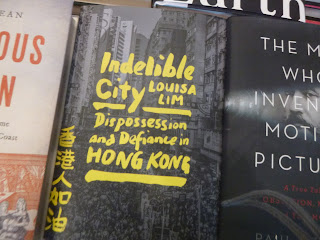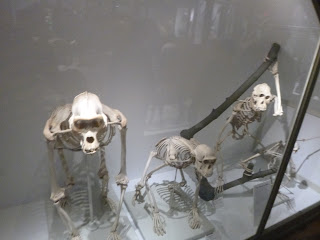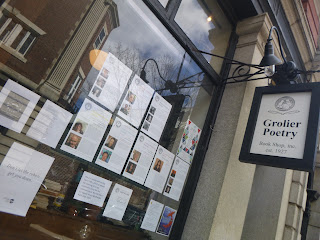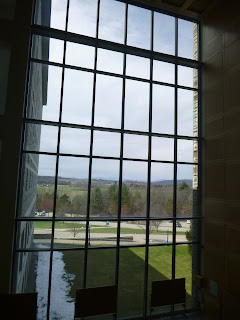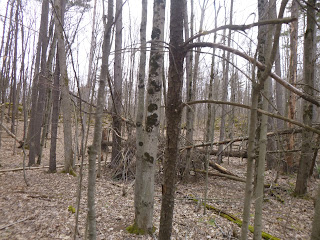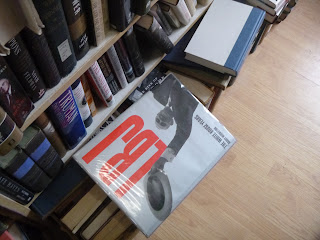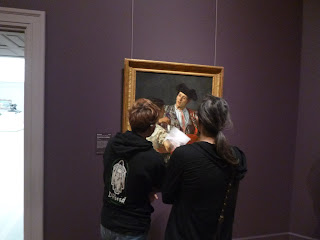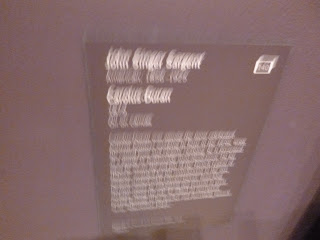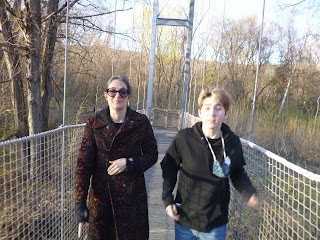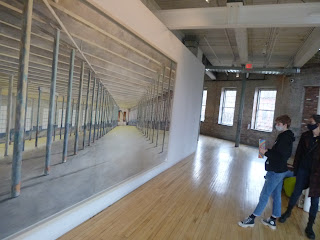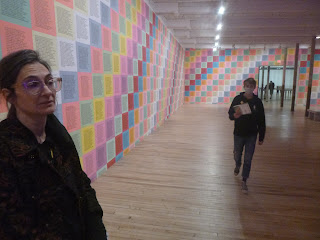I always loved EE Cummings…
than wisdom lady i swear by all flowers…
laugh, leaning back in my arms
And death i think is no parenthesis”
Emily Dickinson loved parenthesis, we learned on spring break,
dashes joining thoughts, contradicting, colliding..kisses better than fate.
Yes, it's spring, feelings everywhere.
Where will we go, where have we been.
How it all changes, the feeling is first.
We chatted about it all, sitting outside at Barbes chatting with Greg and Emily, with Eric at Brooklyn Inn.
My students talked about it, pondering the whiteness of the whale, the journey out to sea, the unknown.
It's magic, says one student.
I think you are right.
We read the story together.
Why does Ishmael go out to sea in the first place?
He needed to.
He was going to hit someone if he didn’t get away from it all.
Sometimes we all feel that way, at least I do.
We all need to go, to get away from the city killing its trees trees to save us.
I know I need to. Images of butchered cherry trees fill my instagram feed.
A final day, before we depart.
I ride out to court with my comrades from @ny4change and @xr_nyc for our bust at the Gov’s office, trying to get ny to change business as usual... and repeal #421a as well as pass the #gasfreeny bill ... we can change the city. The time for renewables is now.
Petty charges everywhere.
Our judge finally arrives, telling us they will throw out the charges.
But next time, obey the rules, to get permits to speak out.
Really, it says get a permit in the constitution?
Maybe it's time to disobey?
Later that night, we celebrate passover.
We’ve been around the last couple of years.
Arni and Penel were on the call last year.
This year, they are in parts in unknown.
Still, we eat matzo ball soup of mazzah, or flatbread, without yeast, for the Passover, recalling the Exodus from Egypt,the bread of those fleeing into the desert, quickly prepared on the run.
Al was there. So were Aunt Gladys, Mav, Caroline,Wyatt, Caroline and Bear, with a yamaka.
The teenager was on her way to passover in Los Angeles.
Everyone told stories about their own struggles.
We remembered Uncle Arnie and Nunu, Aunt Judy and Uncle Tom, grateful for those here and those in parts unknown,.for this life and that.
The next day, the teenger climbed in the trees, exploring the stacks in the library, a cool and old library, where we picked up books, piles of books as the kids learned to read, all those years ago.
And I take one more bike ride through the city to see friends before our week away.
Colin joined me in Washington Square Park.
Yana ushered in the Spring Rebellion, with extinction rebellion, acting up for the climate.
Up 1st Ave I ride to meet my friend Tim in the hospital, Mel feeding him, Tim sipping drinks of coke, greeting me, increasingly isolated.
ALS is cruel.
Back downtown I ride, past East River Park,where the trees are being cut.
“The field so empty
The trees so still
Wondering where did all their bodies go?”
says Sara Matthes.
And our spring road trip begins.
First stop Princeton, NJ, where grama welcomed us.
And the tree in front beckoned.
And we climb, wondering what they think of us.
What are the pronouns for a tree?
My mind travels to friends near and far.
Trees that are no longer here.
Friends taking busts for the trees.
Harriet from East River Park action wrote….
Ourpark@eastriverparkaction.org
“On Saturday morning, April 9th, Rev. Billy, Sylver and I each chose a cherry tree to stand with and protect. Scores of police including the NYPD Strategic Response Group arrived. Billy and Sylver were arrested and I walked away and continued to document the activists fighting the destruction of the the cherry trees and the London plane trees that line the west side of the FDR. On Monday Eileen Myles was arrested defending a tree. On Tuesday Rev. Billy Sylver, Arielle and Jess were arrested defending the cherry trees. But the destroyers were relentless and the police protected them throughout. …rage and heartbreak as a response to this ongoing ecocide. The cherry grove is gone. We are committed to continue our struggle and invite you to join Rev. Billy and the Stop Shopping Choir to reflect … "Our bodies are also the Earth. We can dance like the trees in the wind. Let's remember what we've been through, share the stories, pull up the humor that is there even as we are exhausted and saddened by what has happened. We can find new togetherness. A very original community is growing, you can feel it. By keeping the Cherry Trees alive in our souls, we can stand down the saws and the guns that await us in these strange times." - Rev. Billy
Alive in our souls, bodies earth, dancing like trees, we hit the road, keeping it simple, not Vietnam where Monica rides, joining strangers, 80 miles a day, instead we listen to our Leonard Cohen records and drive north, exploring our backyard.
This time it's simple, a hike, a song.
"The first Easter taught me that life never ends and love never dies,".. the more we love we lose, we disappear, we learn, we connect, we circle…” says Kate McGahan.
So we circle.
Mom shows us the daffodils and we make our way, Brenda Kahn’s Epiphany in Brooklyn, Caroline and Joss’ favorite album from 1992, accompanying us along the way.
“I don’t sleep, i drink coffee instead.”
Up north to 95 toward the George Washington Bridge, we make our way across Manhattan, through the city, up to Connecticut, thinking about wales and witches, and bits and pieces of our history and heritage.
Onward, circling through, toward Middletown, our college tour begins. We were going to be in Thailand, but the tickets got canceled. So we kept it simple, visit some schools, enjoy a road trip, with bad American food, a laugh at a Greek dinner. Arteries of oversized diners clogging on the super sized meals about us. We’re two hours of NYC, but we might as well be in Nebraska. Americans scare me. It's official. Still we make our way through the tour. Signs for insurance companies, Mutual of Omaha, the economy of gaming and rip offs, monthly payments and few rewards. Driving high is a DWI says another sign. We see your potential, says another. Whooping cough vaccines inside. On we look for the lost mainstreets.
Signs of life here and there, student art, hiking trails, a head shop, a lively main street full of mini delis with cheap beer. We used to visit there in college, hanging out with chums, exploring the landscape, of the former port, turned industrial center, now decaying. Art kids in black, scruffy students, zipping about, to the library along the hiking trail.
Now what do we do with our day,
Out to Wadsworth Falls, a state park for a hike, strolling along the Coginchaug River, among the trees, taking in the nature, hiking through the afternoon, remembering the Santa Cruz hike the year before, on and on. How did we get here?
A few ups and downs, Indian Food, Our Flag Means Death, Lolita, Death in Marseilles, and Gentleman Jack get us through the night, lesbian dreams, slow movement, morning light, before we make our way out to North Hampton.
My favorite podcasts for the road, Lavender Menace and No Dogs in Space. Stories about bands and opinions about the world from two non binary lesbians
“Barret and I have learned to be good travelers,” says Caroline, reminding me to chill, even when the banality of our landscape becomes too much. “Sometimes you go with the flow. Sometimes you flow into shit. All you need is a roof.”
THe implication is that I am not, sadly true. Guilty as charged.
But the road can be scary. I can’t get the image of the Greek Dinner out of my mind.
Americans eating huge plates of cholesterol clogging meals, huge plates, of burgers and meat loaf, half finished, sweating, their hearts working to pump blood through their overtaxed systems.
A walgreens outside advertizes whooping cough vaccines.
A Jesus saves sign in the distance, above the strip mall.
On the podcasts continue on the way to North Hampton.
North Hampton Mass isn’t as scary. It’s actually quite the opposite, with a quaint feel, a botanical garden, cool art, biking paths, a pot dispensary, lots of bookstores, a lovely little Moroccan restaurant with a funny owner, a fierce history, and a former president who famously did very little.
Who is Coolidge?
What did he do?
I don’t know.
Oh yea, he was the one who did nothing before Hoover did nothing.
On we visited colleges, Smith and Amherst and Mount Holyoke.
Smith is like a celebration.
“"Reach the eye, the heart, and what we may call the heart of the mind," says the plague for Robert Frost on the Amherst Campus.
“The woods are lovely, dark and deep,. But I have promises to keep,. And miles to go before I sleep,. And miles to go before I sleep."
God knows we all do.
Amherst is a bit of a revelation.
Channeling Emily Dickenson and Robert Frost at Amherst, wandering through the Arboretum at Mount Holyoke, reading poems outside by the trees, hanging out, thinking about Emily up on that yellow house, writing her poems about friends, corresponding with the poetry editor at the Atlantic, writing her 1,800 poems with all those dashes, loves and losses, friends and engagements, drafting notes about the terror that grasped her and us, taking in the trees down the street from the yellow house and those poems on losses and friends and death, a lovable recluse for the ages, rarely leaving.
At night, we watch different movies or shows, reading our paperbacks, Romance and Marcaille and Lolita, dreams more intense each night… Shannon riding with me on the subway, Steve greeting me, Arni here, and then gone, as if a friend, dropping by from another world, another life. The little one read their own volume of poems, reflecting on art and art conversation, science and history, the ways we learn, daydreaming about what might happen, how they will grow, what kind of a life they will have.
Why did I bring Shannon on the subway?
She’s still there on my return.
On we meander to Hampshire down the road, where the queer kids greet us at the coffee shop, and Robbie made art in the art barn, and the “Red Scare” ultimate frisbie schedule is hanging on the bulletin board in between queer theory conference announcements and a film premier night.
I love Bulletin Boards. A young man at our breakfast worries the college is on its last legs.
On the way to Cambridge, an old cemetery greets us, graves struggling with gravity, grass overtaking them. Witches died here, says Caroline, looking at the 18th century churchyard, driving into the gray day.
Two hours later, we find ourselves walking through Wellesley, near Cambridge, among the ethereal buildings, looking at the lake, taking in the 5 floors at the Davies Art Center, Jenny Holtzer on top, Mary Magdalene in the Medieval exhibits, kindov blown away. Kids chuckle by the bookstore, laughing, buzzing about, seeming to be enjoying themselves, an air of confidence and possibility.
By the evening, we return to the scene of the crime, Cambridge and Harvard, where dad made himself crazy to follow in the footsteps of his Dad and three uncles. Once he got there, he worried it was all about reproduction, so your kids can do the same. I certainly do not think that way. I hope for a joyful jumping off point, into a majestic life of adventures, trying to be part of it all, in the arena. We peruse the books at the bookstore, where Fred got himself expelled from the college for borrowing a volume, instead of waiting in line some time in the mid-1960’s. And the Widener Library, where Dad spent hours, in undergrad in the 1950’s and law school in the 1960’s. People are zipping to and from, in and out, few with smiles. I guess it's hard to feel like you have to live up to being on top of the world, beating everyone off. Off we walk down to the Druid, a pub on Cambridge Street, Max used drink at. Guinness tastes good after such a day. Eight down, three to go, the tour continues Wednesday.
Talking about dad we stumble upon Shepard street.
We stop by the Peabody Anthropology Museum and the Grolier poetry bookshop, learning about the dangers of listening to too much Brahms.
"I love nudibranches," says the teenager. Who knew?
Lots to learn from the beetles.
Lots to learn from the poems, I think digging through the volumes at Groliers Poetry Bookshop, on 6 Plympton St, just down from the Harvard Bookstore. I can see Dad and Fred everywhere here, in the square, where they were united after years apart, at the cigar store down the street, perusing the volumes of poetry.
“Here is a picture of Lawrence Ferlinghetti reading here in 1960” says the amicable worker, showing me around the store. Last year during spring break, we were at City Lights, just weeks after he departed.
Love him, I say.
Did you ever see him read, asks our new friend.
No.
But did see him, I say gesturing at the photo of Allen G, across the store.
There are Eileen’s poems.
Stories everywhere.
“Don’t let the robots get you down,” says a sign in the window.
Any recommendations, I ask.
Sure try this, he says pointing to Town Cried, by Sara Mathis. She read here last week.
I skim the first page:
“I thought I understood the basics:
My body would be put through a series of trials.”
I guess we all would, remembering parents who came before, pointing us toward something else of our lives.
And we make our way to lunch.
Richard, Dad’s buddy from Ft Benning Georgia, tells us about his five plus decades at MIT.
And Bear unpacks ways science can help teach us about history.
Richard and Caroline chat about Berlin, where he grew up after the war.
With encouragement, we move forward.
Bear gets an invite back.
Why not.
I look at the record and comic book shops, glancing about the Cambridge that Dad loved, a memorable cigar shop, streets seeping with history, Winthrop Street and JFK, knowledge that comes this way or that, wondering what learning is all about, the mere transmission or knowledge and social reproduction or education to transgress, as bell hooks famously put it.
Our suffering connects us with everyone else, says James Baldwin on the podcast on the way out of town. “You think your pain and your heartbreak are unprecedented in the history of the world, but then you read. It was books that taught me that the things that tormented me most were the very things that connected me with all the people who were alive, who had ever been alive.”
Emily Dickenson felt a terror that grasped her to the depths of her soul.
No one really knows what it was, but i suspect, it's the ontological awakening we all have, reeling we are here, but maybe only so long. What is this ? How did we get here, lament the Talking Heads on the radio.
On we drive through the woods off 95 to the country roads, past bike shops and small towns, on the way to Middleberry, snow still on the ground, more and more trees, bright red barn houses, a bright shimmering light reflecting on it all.
There is something about the snow in the trees, that makes you want jump on the trail and hike, or run down a mountain.
Emily is with us on the way to Vermont, chatting about history, hopes and dreams, wherever the conversation would take us, looking at the snow and the woods.
“I”m nobody, who are you?” says Emily D.
“Are you nobody too?”
I guess we all are, morning light for everyone to share, rocking chairs looking out at the day from our local inn.
Jamie, my friend from graduate school, shows us around, chatting with us about his research, taking us for a class. Stanley is alive in our conversations. Frances Fox Piven lives on and on.
On we explore the Vermont coffee shops and farms and trails and used book stores, art shops, quirky spaces. Bernie country, its ideal, cheese, coffee here, not much diversity there.
Mud season, it's everywhere, on our feet, on our shoes slushing through Wright Park, just below the river.
A chalk sign greets us outside of Otter Creek Books:
And whispered to her neighbor,”
It certainly is.
So we make our way, through valleys and forests, west past Bennington, Vermont to Williamstown, in the Berkshires, bordering New York and Vermont, North West Mass, to visit the last college of the tour. Founded in 1749, by Colonel Williams, who left money for a college, Williamstown feels idyllic, from a separate time and space.
They didn't’ want me in 1987.
I want to talk with the tour guides about this error.
Our amicable tour guide sells it like a car.
It's hard not to want to buy.
Purple mountains in the morning, we hike the woods behind the Clark, a museum in town. A sign says don’t pet the cows. A woodpecker knocks in the distance. We walk into the mountain trails.
What is that we wonder, he’s knocking away, wood cracks, winding through the woods, along the mountain range.
Up and down we walk, down to the museum below, spending the morning with John Singer Sargent in Venice, Winslow Homer on the water, George Innes pastoral, images of Bacchus, the Women of Amphissa, excess, harems, bodies, histories. A docent leads us through the collection and her idea of art, rich people buying, creating culture. I think of the decolonizing people are doing in museums…
The process becomes more extensive in the afternoon at the Mass MOCA, located in a former electrical plant. Nicholas Whitman’s images of the old plant, the shuttered Sprague Electric Company, closed in 1988, remind us. We can always repurpose space. Every closed shopping mall or plant can be an art space, a place to explore a camera obscura, a place to experiment with sound, image, texts, dolls hanging from the ceiling, toys soaring above, Hotzer’s words still linger, “Protect me from what I want......”
“ abuse of power comes at no surprise…”
“ expiring for love is beautiful but stupid…”
“Change is the basis of all history.”
Words scream from the walls, the end is the beginning, declares Joe Wardell' s " “Hello America: 40 Hits from the 50 States,” just around the corner, text on text, JG Ballard, onward, backward, the beginning is the end. "a mural of bold colors and text that was painted directly on the wall … inspired by J.G. Ballard’s 1981 book “Hello America,” in which our country becomes an empty, abandoned wasteland in the late 20th century."
I try to locate the words….
“You can have democracy or you can have concentration of wealth, you can’t have both.”
Lights blur… James Terrell disorients, Caroline and Bear get the black room.
I get the strobe light.
And we walk into the morning, along the river, stumbling into lost objects, walking with the train tracks, along the old trail; the river flows to our left, looking back at our days on the trail, the road ahead, in Cold Spring and Van Cortlandt Park, a final spring break walk, before more homework.
Be here now, I think looking at the road.
Thoughts linger, photos, images of a strange spring break, bringing us back to New York.
Down the FDR, past East River Park, trees gone.
Others trees stretch from the sidewalks, Cherry Blossoms still alive, driving back to New York, into a splendid afternoon.
Kids are playing when we arrive.
Our time with kids and spring breaks feels like it's toward the end.
Not a 24 flight from Thailand, but something. Perhaps just what we needed.
Back home, I think of the dream again, taking Shannon, our cat, on the subway, without the cat bag.
Leaving her somewhere.
Returning, she’s waiting for me.
Back home we go.










.jpg)













































































































































